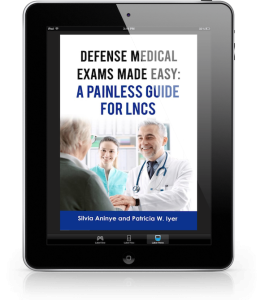The Legal Basis of DMEs for LNCs
Before I go into the legal basis of DMEs, I want to share with you my preparation for observing DMEs.
My Preparation for Observing DMEs
I began attending DMEs in New Jersey while doing medical summaries for a plaintiff’s personal injury attorney.
He asked me to attend some of the DMEs scheduled for the clients whose medical records I summarized. I had no formal training in DMES and asked some of my colleagues how to handle my role.
As I recall those exams, a few memories stand out:
- A neurologist completed the physical exam in 7 minutes.
- The disparity in some cases between the plaintiff’s medical records (with ongoing pain) and the report of the DME doctor, who found no injuries.
- The young girl with a head injury struggled for 45 minutes trying to complete the detailed paperwork handed to her by the receptionist. I wanted to help her, knowing her medical records, but could not because the work was supposed to reflect her knowledge, not mine.
- The law firm’s paralegal told the plaintiff that the exam started at 10 AM and told me it began at 10:30 AM. I missed the experience, and the physician would not let me in because he was almost finished when I arrived.
- The kindness and sympathy on the face of the physiatrist who watched a young man with bilateral leg prostheses struggle to walk.
An LNC in New Jersey was not allowed to object to questions or record the exam. We had to take copious notes and immediately write the report before we forgot any details.
Eventually, I began getting requests, often last minute, to provide LNCs to attend DMEs in Pennsylvania, New York, and New Jersey. I trained them for the role and proofread their reports. The woman who purchased my independent LNC business in 2015 continues to get requests for LNCs to attend DMEs.
The Legal Basis of DMEs Made Easier
I co-authored a book with Silvia Aninye RN, AS, FCM, CLNC called Defense Medical Exams Made Easy: A Painless Guide for LNCs and is comprehensive, with a lot of practical details about what happens when you:
- Observe a DME
- Write your report
- Wonder what influences the doctors, defense, and plaintiff attorney
In this book, you receive a blueprint for how to best support your attorney clients, step by step, from preparing the client to testifying in court if necessary.
Some states do not permit an observer to do anything that would disrupt a DME, short of a physician becoming violent towards the LNC or client.
Be aware that your state’s rules may not let you be confrontational, however much you want to protect the client.
Go into a DME observation experience knowing the boundaries of your behavior as an observer. It is essential to check with the attorney-client and your state’s rules about what you can do.
With this clear, balanced picture of what happens in DME, you will be prepared to build a successful practice helping attorneys with a vital role in the legal system.
Legal Basis of DMEs
There are three levels of requirements regarding what transpires during a DME:
1. The standards for examination of a client based on the physician’s specialty
2. The state-specific rules and cases about what the physician can do during an examination
3. The specific dictates of the response agreed upon by the defense and plaintiff attorney
Case law and state regulations define what a physician can and cannot do during an examination. The state may have a mechanism, called a demand and a response, for defining what a specific client will undergo during a DME.
State-Specific Regulations
The regulations and case law results influence the laws and practices in a specific state. A judge’s decisions establish case law in a particular case. For example, a New Jersey case cited in this book, Difiore v. Pezic, affected who could attend a DME and if the exam could be recorded. Attorneys and LNCs in New Jersey were on hold about LNCs attending DMEs while waiting for a decision on this case.
Case law, also called common law, is state-specific. A judge in New Jersey would usually not decide a case based on what a judge in Nevada decided. If the issue is unique, however, a judge might look at another state’s case law to determine if there is a precedent for the case.
Judges have a great deal of authority and are either appointed to the bench for a specific term, appointed for life, elected to the position, or some combination of these methods, such as an appointment followed by an election. The DME practices in a state can be established, challenged, and changed based on case law.
State regulations, constitutions, or statutes may govern the state’s DME practices. All 50 states have laws regulating the plaintiff’s physical or mental examination. Many states model their rules on federal rules and retain the number 35 in their regulations.
Some states reiterate the federal language. Some states may have separate laws for a defense medical examination ordered for a personal injury versus a worker’s compensation case.
Demand and Response
In states that use demands and responses, the defense initiates a demand that the plaintiff undergo a defense medical examination. It may specify what they want to occur during that exam. The plaintiff’s attorney responds to that demand within the time frame specified by state law. After reading through the demand, the plaintiff’s attorney may object to something in the demand by stating, “I’m not going to let my client do this per this law, regulation, or jurisdiction” or there is case law that prohibits that request.”
The plaintiff’s attorney cites those cases in the response. When the plaintiff and defense attorneys argue about specific points, they often cancel the DME until they can resolve the argument.
When everything goes like clockwork, the defense won’t write a rebuttal for the response that the plaintiff’s attorney gave. If the defense hasn’t written a rebuttal to the response, the response will govern what occurs during the exam.
The Physician’s Reactions to the Response
At times, the DME physician will attempt to ignore the response. As my coauthor, Silvia says, “I tell them, ‘Per this regulation in California, Statute 2032, it says you have to go by what is agreed upon between the defense and the plaintiff attorneys, and what is in this response is what the defense and plaintiff attorney have agreed on.'”
Some doctors say, “I don’t do my exams that way.”
“It doesn’t matter. You have to go by these specifications because when you agreed to do this exam, you agreed to abide by these specifications. If you refuse to abide by these specifications, I will stop this exam right now and have you call your attorney, whoever hired you, and I call my attorney, and they can thrash out what will be done or won’t be done.” That has happened to Silvia.
The Jurisdiction is Paramount
The state regulations where the case was filed govern what occurs in the exam. For example, if a client is having a DME in a different state, let’s say in Nevada, the Nevada doctor has to follow what’s allowed in California. The doctor must follow California guidelines if the jurisdiction is in California. Now, if the case is in Nevada, but a California attorney filed the case, the DME doctor would follow Nevada regulations. Despite this requirement, some physicians try to subvert or ignore the rules.
Before the exam, the LNC should establish with the attorney-client the rules the DME physician must follow. If the doctor deviates from the case’s jurisdiction’s rules, and the LNC can intervene, they will stop the DME and call the plaintiff’s attorney. The LNC will tell them what the doctor is doing. The doctor typically calls whoever hired them before returning and complying with the rules. Why? Because the defense lawyer says, “You have to follow the rules of the state where the case was filed.”
The LNC’s Role in the Demand and Response
When the LNC is contacted to reserve a date and time to observe a DME, they should ask the attorney about the state-specific regulations and case-specific demand and response. Responses are not completed for all cases, particularly smaller ones with limited damages.
If you have the response, give it to the doctor, who is supposed to look it over. Having the response is ideal because it makes the job of the LNC easier. Specifically in states where the LNC can hand it to the physician to review the exam parameters. The doctor is supposed to look over it and then do the exam. But 80% of the doctors will get it and not even look at it due to feeling pressured by the nurses. Or, they like the idea that they have the power because they’re doing the DME.
Sometimes, Silvia asks the plaintiff’s attorney three or four times for the response before the date arrives and never get it. You learn in the business to know the ones who will do that. Some attorneys will email you and tell you to go to the DME. They’ll let you know who the attorneys are on the defense side and who the doctor and client are. And that’s all you get most of the time.
Conclusion
States approach DMEs in a variety of ways, yet with core elements in common. Use the search terms “your state” and “independent medical examination” or “physical and mental examination” to locate the state’s statutes related to DMEs. Check on recording and other details allowed in the state.
Your attorney-client is the best person to advise you of the specific DME rules. They know the jurisdiction and how they govern the examiner’s and your conduct at the exam. Case law and rule changes occur continuously, so verifying your understanding of the rules is imperative.
Get my new book with Silvia Aninye RN, AS, FCM, CLNC. called ‘Defense Medical Exams Made Easy: A Painless Guide for LNCs’.
‘The Defense Medical Examinations Made Easy’ book provides a strong framework for the LNC setting out to witness a defense medical examination.
You will know exactly what you need from the attorney, how to prepare your patient-client and so much more.
To order, click here.

Pat Iyer is president of The Pat Iyer Group, which develops resources to assist LNCs in obtaining more clients, making more money, and achieving their business goals and dreams.
Have you heard the most recent podcasts on Legal Nurse Podcast? The show is in its 8th year, putting it in the top 1% of all podcasts for its longevity. Watch our podcast on YouTube at http://LNC.tips/YouTube.
Join our Facebook group, LNC Business Growth Circle, to be part of our LNC community.
Pat’s related websites include the continuing education provided on LNCEU.com.
The podcasts are broadcast at podcast.legalnursebusiness.com, and writing tips supplied at patiyer.com.
Get all of Pat’s content in one place by downloading the mobile app, Expert Edu at www.legalnursebusiness.com/expertedu. Watch videos, listen to podcasts, read blogs, watch online courses and training, and more.


